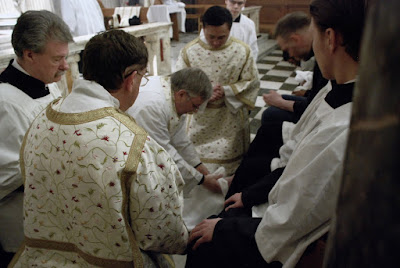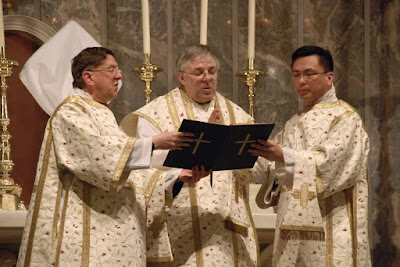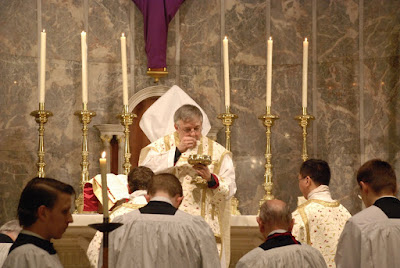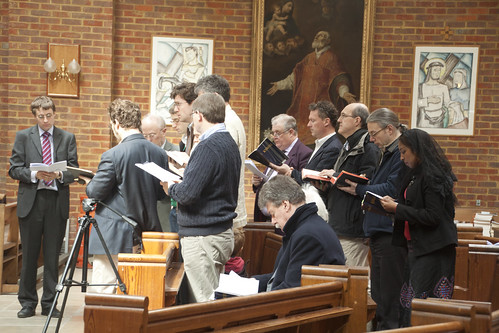Chairman's Blog
Maundy Thursday in St Mary Moorfields, London
With Canon Peter Newby, assisted by Fr Michale Cullinan and Fr Cyril Law.
Support the work of the LMS by becoming an 'Anniversary Supporter'.
Stations of the Cross: new short video from the LMS
Support the work of the LMS by becoming an 'Anniversary Supporter'.
Triduum Recess
 Jesus is laid in the Tomb,From a series of plaques depicting the Seven Sorrows, at Carfin Shrine, near Glasgow.
Jesus is laid in the Tomb,From a series of plaques depicting the Seven Sorrows, at Carfin Shrine, near Glasgow.
Wishing my readers a holy Easter Triduum, and the joy of the Resurrection.
Support the work of the LMS by becoming an 'Anniversary Supporter'.
Guild of St Clare: 'Learn to make a skirt': two-day course 7th May and 11th June
 Children welcome. Sewing at the St Catherine's Trust Summer School, supervised by two
Children welcome. Sewing at the St Catherine's Trust Summer School, supervised by two
Guild of St Clare members.The Guild of St Clare, which is affiliated to the Latin Mass Society, serves the Church by passing on the skills needed for the maintenance, repair, and the making of liturgical vestments. It also aims to promote 'domestic' sewing skills, which should be taken for granted by those undertaking training in emboidery, goldwork and so on. It is astonishing to think that within living memory almost every household had a sewing machine, and women routinely made clothes for themselves and their children. These skills have all but disapeared. Few children today can even thread a needle.
The Guild is pleased to announce a new initiative: a two-day course within which participants will be able to make every aspect of a skirt - and do it properly, and end up with a wearable garment.
In response to popular demand, we are introducing dressmaking workshops under the supervision of our own in-house expert dressmaker, Clare Auty. The first of these will be spread over two days, the 7th May and 11th June, when we will make a lined skirt with a zip and waistband, and the option of pockets which can be embellished.
Continue reading here.
Support the work of the LMS by becoming an 'Anniversary Supporter'.
Reacting to novelties in the Church
 LMS Pilgrimage to Our Lady of Caversham. Come on in.It must be a perennial truth about the Church, that to every issue some people will criticise what you do - whatever it is- as too 'soft', and others as too 'harsh'. Since Vatican II, this has gone from being a parlour game to a major industry, as those who have wanted to maintain the Faith in its integrity cheer themselves up by criticising each other for being either too accommodating of novelties, or too suspicious of them.
LMS Pilgrimage to Our Lady of Caversham. Come on in.It must be a perennial truth about the Church, that to every issue some people will criticise what you do - whatever it is- as too 'soft', and others as too 'harsh'. Since Vatican II, this has gone from being a parlour game to a major industry, as those who have wanted to maintain the Faith in its integrity cheer themselves up by criticising each other for being either too accommodating of novelties, or too suspicious of them.
The 'circular firing squad' this easily becomes is not helpful to the cause, but the question, of how suspicious or accommodating one should be, is an important one and does need to be addressed seriously. Which new initiatives, new theological perspectives, new structures or new forms of worship, are perfectly ok, and which are not? Of the latter, which need to be criticised, where possible evaded (by not using them), or repudiated? Each initiative should in principle be treated on its merits, though the scale of the avalanche of new things since 1960 is itself open to critical assessment.
(Anyone afflicted by the thought 'Anything the Pope says must be ok' should, of course, read my posts about Papolatry, but can still follow the argument in this post by considering examples where the Pope had not actually mandated anything. In a number of cases Popes have condemned novelties, which have still spread through the Church, such as routine use of EMHCs, or General Absolution.)
The difficulty in most cases has been that the problem presented by the new things has been not that they contradict the teaching of the Church in a propositional way - only in seminaries and certain academic institutions have Catholics actually been asked to deny the faith in as many words. Rather, where the old version of whatever it is pointed towards the teaching, the new one points away. They are typically accompanied by official documents which are worded in such a way that they can be read, perhaps with a little effort, in accordance with the Church's teaching, and also read, with a little effort, in accordance with a new view which is not compatible with the teaching of the Church (although this may depend on ignoring some of the document in question).
To avoid tiresome abstractions, let me give an example: Communion in the Hand (CITH). It was allowed, we all know, by Paul VI, though strictly speaking Memoriale Domini was an Instruction of the Congregation of Divine Worship. It is perfectly obvious that CITH points away from the Real Presence. It is, in fact, acknowledged by Memoriale Domini itself, which pleads that the practice be introduced, if at all, only after 'adequte catechesis':
The result of this catechesis should be to remove any suggestion of wavering on the part of the Church in its faith in the eucharistic presence.
By contrast, communion on the tongue evidently points towards the Real Presence: as Pope Benedict expressed it, it marks it with 'an exclamation point'.
That is not to say that CITH is propositionally incompatible with a the Real Presence: heck, it's a practise, not a proposition. And it can be favoured by those who genuinely believe in the Real Presence, on other grounds, though it is notable that these grounds do not derive directly from the teaching of the Church. They might include, for example, an ecumenical motive (to bring the practise of the Catholic Church into line with that of Protestants), a desire to emphasise Christian 'adulthood'; the idea that the traditional practise emphasised the Real Presence at the expense of other features of the liturgy or the Christian life; or that the old practise was just embarrassing.
This kind of thing raises the question: 'How bad does a novelty have to be (how emphatically must is point away from the teaching of the Church), how radically must it infringe normative tradition, on the one hand, and on the other hand how weak must be the arguments in favour of it, and the mandate of legitimate authority in favour of it, for it to be a duty to evade or criticise it?' In many cases, priests are involved in implementing the novelty, so they have a particularly stark version of the question to answer. One thing which is obvious is that there is no simple way to answer such questions. No one can propose a formula for weighing the different considerations against each other, or a scale of seriousness by which the different aspects can be assessed in themselves. Reasonable people, thoughtful people devoted to the good of the Church, will draw the line in different places. It is essential that we recognise that. It is essential that we recognise the good will of those who draw the line in different places than we do ourselves.
This recognition must, however, be carefully distinguished from an attempt to turn the issue into one of personal preferences. A lot of Neo-Cons say things like: 'I personally prefer Latin / Communion on the Tongue / whatever, but I don't criticise those who don't'. If CITH, or whatever it is, was a mistake, it was a mistake for everyone. If it was a good idea, then (certain cultural and historical situations aside), it is good for everyone. In either case, the reasons for and against have got nothing to do with personal tastes. It is a matter of theology, and perhaps of human psychology.
This may be hard for people to do, or for people who aren't used to the kind of disagreement academics engage in, but we have to hold these two things together: I can accept that my opponent on one of these issues is sincere while still maintaining he is objectively wrong. Again, I can maintain that the matter we are discussing is one of objective truth and of great importance, while still respecting the moral integrity of those who disagree with me. Of course, there are positions so extreme or poorly motivated that the integrity of those holding them is called into question, but not all positions except one's own are like that. There is at least a range of options which are not completely unreasonable, and this range is wider than the range which is objectively morally legitimate, and this latter range may well be wider than just one option.
A major source of disagreement on such matters is naturally the weight to assign different factors. No doubt those who accept and even promote CITH do not regard it as as damaging to belief in the Real Presence, as those who criticise CITH. How damaging it is to the faith of ordinary Catholics is an objective question, just one not easy to answer. Suppose it were very damaging, and many Catholics did not realise this, then their acceptance of the practise would be objectively wrong, but it would still be subjectively reasonable. They would not be committing a sin by accepting it, unless their failure to realise how bad it is was itself a result of sin (of negligence, say).
Saying such issues are matters of personal taste trivialises the issues. It also obscures the effect of the novelties on the Church as a community. The novelties affect everyone, even those who do not accept them (in this case, those who go on receiving on the tongue), because it affects the general tone and atmosphere, what actions are regarded as normal and what as eccentric or singular, and of course it affects people's beliefs. If the congregation in my local Church, or the parents involved in my local Catholic school, weaken in their faith, this is a problem for me. I can't just pretend nothing has happened, and carry on as normal.
This is clearly true also for attitudes to marriage. Already we have a situation when most parents sending their children to a Catholic school accept same-sex marriage, contraception, cohabitation, and remarriage after divorce, without annulment. Things have got so bad, in fact, that it is regarded as the height of straitlaced orthodoxy, to say of a case of institutionalised adultery, 'well, let's hope that they can get an annulment', as if the only correct view to take of a sinful lifestyle is to close our eyes and imagine, without any particular justification, that for obscure reasons it may not be as bad as it looks. A lot of things the Church has done at the institutional level, a lot of post 1960s novelties, have contributed to this collapse of the Faith by 'pointing away' from the Faith. The weakening of the Church's official opposition to civil divorce, and to mixed marriages for Catholics; the failure to preach against contraception; and a widespread collapse of discipline over who can receive Communion, or be involved in Church activities.
It is unimaginable that Pope Francis is going to reverse this trend when he publishes the Post-Synodal Exhortation. The only question is how far he will go in accommodating the Church still further to secular attitudes, thereby reinforcing them within the bosom of the Church. There has been little, if anything, lay Catholics or ordinary priests have been able to do to manifest a rejection or criticism of the policies which have led us to this pass, when those policies have been a matter of changes to Canon Law, to catechetical textbooks, or to Bishops' statements on forthcoming civil legislation. As far preaching about contraception, and refusing Communion to public sinners, the pressure on priests not to do such things has been intense, and there has been little lay Catholics could do to assist them.
Developments in the future may make it harder, or in some ways easier, to criticise novelties, but how it can be done depends, as I keep saying on this blog, on the precise form they take. On the recent change to Canon Law procedure, the accelerated process for annulments, the matter is in the hands of bishops. I doubt that it would be justified for individual priests to deny the Marriage Rite or Communion to a couple who had had a 'quickie annulment', and they'd be for the high jump if they tried it. What can lay Catholics do about it? Write blog posts, I suppose.
Over the last fifty years, resistance to novelties has coalesced into the movement in favour of the Traditional Catholic liturgy. Not all novelties, of course, have been liturgical, but one's ability to make a critical assessment of any of them is crippled if one is ideologically committed to a huge number of liturgical ones. This movement has provided a home, a friendly environment and a source of moral support, for both clergy and laity uncomfortable with a wide range of novelties. It is to this movement, in my view, that we must look for any kind of sustained, collective resistance, to the next things coming down the road.
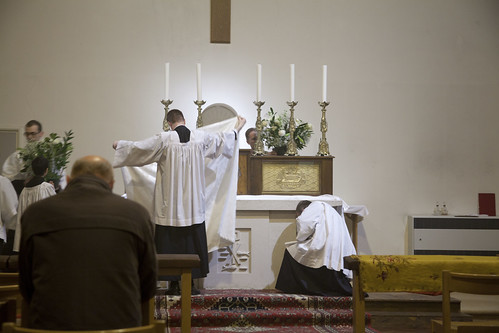 The Stripping of the Altar, at the end of Mass on Maundy Thursday.Support the work of the LMS by becoming an 'Anniversary Supporter'.
The Stripping of the Altar, at the end of Mass on Maundy Thursday.Support the work of the LMS by becoming an 'Anniversary Supporter'.
Reminder: Family Retreat 2016: 1-3rd April, with the Sons of the Most Holy Redeemer
Update: the two priests of the Sons of the Most Holy Redeemer, from Papa Stronsay in the Orkneys, will preach on the theme of 'Eternal Truths':
1. The Importance of Salvation
2. Confession – necessity of contrition for confession
3. Hell – Manifestation of the Justice of God
4. Prayer – a means of salvation
5. Devotion to Our Lady – God’s gift to mankind.
Right after Easter the St Catherine's Trust Family Retreat will take place: from the afternoon of Friday 1st to lunch on Sunday 3rd, at Ratcliffe College near Leicester. It will be led by Fr Magdala F.SS.R and Fr Jean F.SS.R from Papa Stronsay; there will be High Mass and other liturgies (Benediction, Vespers etc.) in the Extraordinary Form; as always there will be a Marian procession through the lovely grounds of the Oratory School; the priests will give spiritual conferences; there will be activities for children.
The theme of the conferences will be 'Eternal Truths'.
Don't get left out! Discounts available if the headline price is a problem.
Everyone is welcome; we call it a 'family retreat' because we make special provision for families, but no one is excluded! More details; online Retreat booking form; online Chant Course booking form.
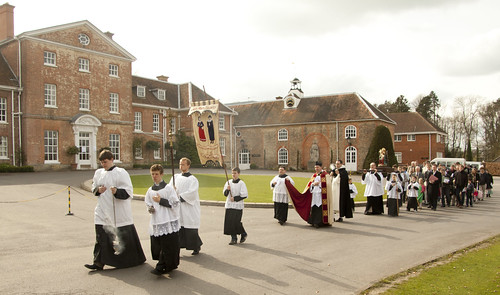 A past Family Retreat in the Oratory School
A past Family Retreat in the Oratory School
Alongside it is the Gregorian Chant Network's annual Weekend Chant Course - a chance for something more than a day-long training session, with a bit of theory with the practice, and plenty of opportunity to sing 'for real', in the liturgy. Led by Colin Mawby and Dr Christopher Hodkinson.
All levels of experience, men and women, everyone is welcome! There are special discounts for groups coming from the same schola. All the details are here.
Bring your choir! Get up to speed together, and you'll be able to put it into practice right away when you get home. And it will be very cheap per head.
Support the work of the LMS by becoming an 'Anniversary Supporter'.
The right way to deal with offensive liturgical texts
 Another photo of the Sung Mass last Sunday, Passion Sunday, at Holy Trinity, Hethe.The way to deal with offensive texts is to explain them. Such explanation may show that they are not, in fact, offensive, or it may show that they genuinely condemn something held dear by the offended person. If the enquirer is sincere, and the explanation is of the former kind, then he will be satisfied. If the explanation is of the latter kind, then he needs to hear it.
Another photo of the Sung Mass last Sunday, Passion Sunday, at Holy Trinity, Hethe.The way to deal with offensive texts is to explain them. Such explanation may show that they are not, in fact, offensive, or it may show that they genuinely condemn something held dear by the offended person. If the enquirer is sincere, and the explanation is of the former kind, then he will be satisfied. If the explanation is of the latter kind, then he needs to hear it.
Thus, the claim is sometimes made that some or all of the Gospels are anti-Semitic, on the grounds of passages such as the cry of the crowd to Pilate, condemning Christ: 'His blood be on us and on our children' (Matthew 27:25). In his commentary on this verse, Pope Benedict points out that being sprinkled with Christ's blood has a very different meaning, for Christians, than acquiring blood guilt (Jesus of Nazareth: Holy Week, p187). Pope Benedict refers, like St Thomas Aquinas in his own commentary on the passage, to the Letter to the Hebrews, contrasting the effects of the blood of Christ with that of the murdered Abel (Heb 12:24). I was reminded of this last Sunday, in the Extraordinary Form, when we heard an earlier passage from Hebrews (9:13f):
For if the blood of bulls and of goats, and the ashes of an heifer sprinkling the unclean, sanctifieth to the purifying of the flesh: How much more shall the blood of Christ, who through the eternal Spirit offered himself without spot to God, purge your conscience from dead works to serve the living God?
This observation turns any possible anti-Semitic usage of the text on its head, revealing a completely different way of looking at it. Whatever the crowd meant, and whoever the crowd actually comprised (as Benedict points out, the Chief Priests and a Zealot rent-a-mob wanting to free Barabas), the cry does have a mystical and enduring significance, like the saying of the Chief Priest that 'one man should die for the people' (John 11:50), and this is not something we need to hide from.
By contrast, when the claim is made that St Paul (eg in Romans 1:27) did not think that people sexually attracted to others of the same sex were morally entitled to lives of sexual self-expression and fulfilment, we have to say: Yes, he did think that, and the Church teaches it, and it is true. The caveats we need to make are not about St Paul's sexual ethics, but the question-begging and tendentious notion of 'sexual self-expression and fulfillment', the category of same-sex attraction itself, and all the rest of the machinery of modern liberal sexual ideology. But we know what they mean when they make the claim, and in their own terms they are perfectly correct. It is a matter of deep and bitter pain to many to be condemned in this way: to find themselves, as they understand themselves, condemned. But the Church does not exist to make people feel comfortable about their sinful ways of life. The fact that such people are often deeply vulnerable and in pain does, of course, affect how we address the issue, but it also points towards the failure of modern sexual ideology to give them any kind of peace. They need a route out of the way of thinking they have become trapped in, and it is not an act of mercy to withhold it from them.
The attitude of the ancient Latin liturgy towards those outside the Faith, whether they be heretics and schismatics, pagans, or Jews, is not of indifference. It is impassioned, pleading, and strongly-worded. We are not talking about subjective guilt necessarily, but of the objectively problematic situation of refusing the call, and of the somewhat different, but also problematic, sitution of not having heard the call. The reformed liturgy comes over as a trifle self-satisfied here, but we should not be. We should not be happy about the fact that the Gospel has not transformed the lives of any of our fellow human beings. We should not be happy that they do not have the sacraments, or that they are not in union with the Pope. We should, at least, pray for them.
This concludes, at least for now, my series on the Prayer for the Jews. I should reiterate what I said at the start of the series, that I did not particularly want to spend time on this issue, but that a Position Paper became necessary in light of the action of the Bishops of England and Wales asking the PCED is replace the existing version of the prayer in the Good Friday liturgy with the Novus Ordo equivalent. The question of the place of the Jews in the economy of salvation is not a constant topic of the Catholics attached to the Traditional Mass I know, any more than sex is a constant topic of conversation among Catholics in general. We don't minimise the importance of the issue; we are simply quite happy with the teaching of the Church about it. We are, however, forced to talk about it because of the obsession of our opponents, who want to attack us through this issue. I am reminded of one of my favourite letters to the Catholic press of all time:
If the Catholic Church is identified solely by its sexual moral precepts, it is largely due to those within the Church who persistently raise objections and maintain the the Church has got it wrong. It is a paradox that the ones who object are the ones who are doing the preaching, and perhaps we should be thankful to them for keeping the matter before our attention.
I hope that, for a good long while, I have said enough. There are plenty of other things to consider.
PS there is an excellent discussion of the issue by a Jewish commentator, Yoram Hazony, here.
Support the work of the LMS by becoming an 'Anniversary Supporter'.
How to read the forthcoming Exhortation
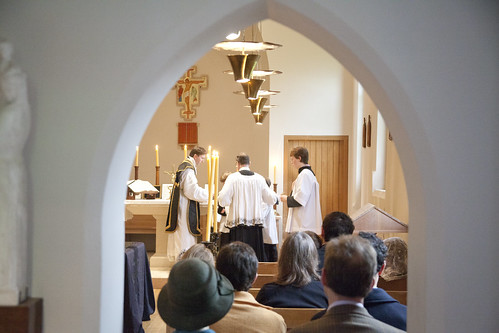 I will wash my hands among the innocent, and compass thine altars O Lord.Everyone is talking about the Post Synodal Exhortation, so why not jump on the bandwagon? Here is some advice which almost everyone will ignore.
I will wash my hands among the innocent, and compass thine altars O Lord.Everyone is talking about the Post Synodal Exhortation, so why not jump on the bandwagon? Here is some advice which almost everyone will ignore.
For now: Don't read speculation about the contents. It is a waste of time, it raises the blood pressure, and it will fill your head with preconceived ideas.
When it published, not everyone will have the time to read long documents. It may be very long; one of the things unofficially abolished by Vatican II was the art of brevity. Most people will read short extracts and commentary. When looking at these, or indeed when ploughing through the whole thing, bear in mind a few principles of exegesis.
1. The Pope can't change the teaching of the Church. No, really, he can't, not even a little bit, not even for the needs of the time, not even with the help of the Holy Ghost. He cannot change one jot or tittle, and anyone who tells you to stop believing what the Church has (really) taught up to some moment in the past, is inviting you to depart from the Church by heresy. Your interlocutor may claim the Pope rejects the old teaching, but, on this point, IT MAKES NO DIFFERENCE what the Pope says. Having the Pope with you in Hell will be no comfort at all - just ask Dante.
How can you know what the teaching of the Church is? On topics like the ones at issue today, it's really not so hard. The Church's teaching on sexuality and divorce is clearly set out in Scripture, in the Papal Magisterium, and in every half-decent catechism of any century you choose. And here is a key thing about the teaching of the Church: if you fear that it is being distorted in the way it is presented today, just look at how it was presented formerly. Look at Aquinas, look at the Catechism of the Council of Trent, look at St Paul. (You don't have be a scholar: just Google appropriate terms and the answer will pop up like magic.) The truth remains the same; the lies change with the wind.
2. The Pope has a special charism to reaffirm the teaching of the Church, should he wish to do so. He will do this in an ordinary way in his speeches and sermons, and he does so in a way actually guaranteed to contain no error when he sets out to speak in a more formal way. The exercise of the gift of infallibility is not primarily a matter of formal procedure, but it isn't something the Pope does without really thinking about it, either. He must be addressing the whole Church, he must be talking about Faith or Morals, he must be consciously using his authority. We are not going to see an authoritative exercise of this gift in the coming exhortation, because the Pope, Cardinal Kasper, and everyone else has told us repeatedly that 'the teaching on indissolubility remains, BUT ...' It obviously doesn't make sense to suggest that what comes after the 'but' is more an exercise of teaching authority than what comes before it. What comes after it is all about the next point.
3. The Pope can change the discipline of the Church, the rules governing organs of the Church such as Marriage Tribunals, and he can also change public perceptions of Church teaching. The fact that he can't change teaching doesn't mean what he says isn't important. One of the things it can do is to bring out, or obscure, the teaching of the Church. In making such changes the Pope has the graces of his office, should he be open to them, but nothing remotely akin to the gift of infallibility. Even good Popes, canonised Popes, have made disastrous decisions on prudential matters. But the long-standing practises of the Church, on the other hand, contain a kind of wisdom, and reflect the teachings of the Church in a special way. If they have stood the test of time, if they have been used and endorsed by countless saints and doctors, if they have nourished the spiritual lives of the Faithful over centuries, if they bring to us today the spirit of ages not infected with the specific errors of our own time, they are precious, they have authority, they should not lightly be tampered with. The consequences of demolishing long-standing disciplinary practises, rules governing the way the Church functions, and the presentation of teaching so as to change perceptions of the Church, are frequently very bad indeed.
4. What is significant about a document from Rome is what it changes, not what it says. This is an exegetical principle of the late Michael Davies: when reading a new document, ask What does it allow which was not previously allowed? What does it forbid which was not previously forbidden? The rest is padding. The truth of this principle becomes clear with the assistance of hindsight. What is significant about Paul VI's Memoriale Domini is that it allowed Communion in the Hand: it is irrelevant that nine tenths of the thing is hymn of praise for Communion on the Tongue, and that it actually says that the existing rules aren't being changed. That 90% of the document is inert, like the polystyrene padding in a parcel. In exactly the same way, what is significant about Summorum Pontificum is that the Traditional Mass is allowed without permission from bishops. The rhetorical concessions to liberals unhappy about this, slipped in here and there, are of no significance. Getting worked up about them is a complete waste of time.
This is the most important lesson of all. When the document comes out, there will be something for everyone. Neo-conservative bloggers will fill pages with quotations from it about the importance and indissolubility of marriage: guaranteed. Liberal journalists will fill pages of the dead-wood media with quotations from it about the importance of mercy: no question about it. Neither makes any difference. It will all be forgotten within the year. This kind of material can be read in line with any number of different views about what, in practise, should happen to the divorced and remarried. The only thing which is important in the document is what it changes, the bits where the Pope uses his legislative authority to make a concrete difference. There are currently clear rules in Canon Law about the rights and obligations of Catholics living in a public state of sin, and of priests ministering to them. These rules can be changed in a number of different ways. Again, rules and principles of confessional practise can be changed, and rules about who can be a godparent - what it means to be a public sinner - and so on.
In a somewhat different way, a sound-bite summary of Catholic teaching can be set out which will become effectively definitive for Catholics in the pew and media pundits alike, and become a master-principle through which theologians (at least those friendly to it) will interpret everything else. It can become impossible for a dissenting (conservative or liberal) speaker to talk for 30 seconds in the media without having this statement shoved down his throat. It can be used by bishops to silence dissent among the clergy; agreement with it can become a test of orthodoxy more authoritative than the Athanasian Creed. This happened after Vatican II with the notion of 'accordance with the orientation of the Council': an incredibly vague, even meaningless phrase, which was all the better suited to tyrannical use as a sledgehammer against anything liberals didn't like. If there are any legislative changes, I expect some such sound-bite will accompany them to make anyone disagreeing with the changes to look stupid, Pharisaical, and disobedient.
No doubt the real meat of the document in terms of legislative change and key sound-bite will be presented to the public pretty quickly after the media embargo is lifted. It can be fun quoting the other bits of a document, but don't expect it to get you anywhere. What is of supreme importance for every Catholic in the Church is that we do not allow anything, whether it comes from the media, from Cardinals, or from the Pope, whether it be our misreading of these sources or the solemn truth about who has said or thought what, take from us our adherence to the teaching of the Church. The teaching of the Church is the teaching of Christ. It is Christ who saves us, through the Church. Let us cling to them, and let the chips fall where they may.
Support the work of the LMS by becoming an 'Anniversary Supporter'.
How not to deal with offensive liturgical texts
 Passion Sunday, sung in Holy Trinity, Hethe, last Sunday. The Gospel, John 8:46-59, is
Passion Sunday, sung in Holy Trinity, Hethe, last Sunday. The Gospel, John 8:46-59, is
not found anywhere in the 1970 Lectionary. It is too scary.Ildefonsus Schuster, the great liturgical commentator of the early 20th century, and a bishop and beatus to boot, remarked of the Good Friday 'Orationes Sollemnes', which he thought of as a single, great 'litany':
In reciting a prayer of such venerable antiquity, we seem to enter into a closer spiritual relationship with those early generations of martyrs and confessors for the faith, who used the self-same words before us, and thus obtained the graces needful to enable them to correspond to their high vocation of witnessing to this faith with their own blood.
A couple of decades later, Josef Jungmann, whose personal views were distinctly reform-minded, not to say modernist, wrote in the great work which has become the standard reference for the history of the Roman Rite, that in the same prayers,
whose echo goes back to the first century, we have the general prayer of the Church in the exact wording in which it was performed … since the third century.
Annibale Bugnini, of all people, wrote about his reverence for these prayers when undertaking the limited re-writing of 1965:
It is always unpleasant to have to alter venerable texts that for centuries have effectively nourished Christian devotion and have about them the spiritual fragrance of the heroic age of the Church’s beginnings.
The point is not that changing such prayers could never be justified, but that the burden of proof lies massively against it.
One of the most remarkable texts to be found in the Position Paper, however, is a remark in an official commentary about the Holy Week Reform of 1956, about the new Latin Psalms created by Cardinal Bea and published in 1945:
In the new version of the psalms expressions are avoided which have acquired another sense in modern languages.
This is a truly vertigo-inducing thought: that the official, Latin version of Scripture, to be used in the Office, in liturgical texts, and as a reference point for vernacular translations, be changed so that it does not suggest false equivalents in modern languages. For one thing, it would be a matter of opinion what is 'misleading'. But even if this were granted, how many languages should be taken into account? Italian, French, Spanish, English? All Romance languages? Why not others as well? And how often should the exercise be repeated: every 50 years? Every 30?
In other words, not only would the Latin source-text be no more stable than a modern vernacular, it would be further twisted into knots to avoid suggesting to a Latin ignoramus anything 'misleading' in umpteen different languages. If this is so for the ideal Latin text, shunting aside the Latin versions used for more than 10 centuries, why not say we need an ideal Greek and Hebrew version? Don't the inspired texts include 'expressions which have acquired another sense in modern languages', including modern Greek and Hebrew?
This is simply the opposite of what Latin is supposed to be: a stable language enabling us to use the very same words as our predessors in the Faith. But it is the logical conclusion of the drive to remove from the liturgy anything which could cause offence. If this is raised to the level of a principle, then we can't stop with litiurgical texts. The same must be done for Scripture itself.
As a matter of fact, the 1945 Psalms were ditched by Vatican II, on the grounds that they failed to take account of 'the entire tradition of the Latin Church' (Sacrosantum Concilium 91), so we've ended up with yet another Latin Psalter, and indeed entire Latin Bible, the 'Neo-Vulgate', which also fails to respect the 'entire tradition of the Latin Church'. (See the discussion of the Vulgate here.)
There is another wrong way to deal with offensive texts: to ignore them. I have laid some stress on the prayers for the conversion of the Jews to Christianity to be found in the Liturgy of the Hours. It doesn't come as much surprise, given the general collapse of liturgical discipline, to hear of people skipping these prayers. What suprised me more, though perhaps it shouldn't have, is that in the German translation the texts are systematically mistranslated.
Christ, Son of David, fulfilment of the prophecies, may the Jewish people accept you as their awaited Deliverer [Messiah].
becomes:
In thee everything proclaimed by the prophets is fulfilled, help us to recognise God in our lives.
Again:Simeon and Anna proclaimed you as the Saviour; grant that the Jewish people may accept your message [Gospel] so long foretold.
becomes:O Christ, who was sung of (about) by the angels, made known by the shepherds, praised by Simeon and Anna; - give, that we may accept your Good News.
(Quotations in Latin and German and references are in the Position Paper, Appendix B.)
This is an outrageous falsification of the liturgical text. But I suppose it is actually less outrageous than the translation of 'pro multis' ('for many') as 'for all' in the words of consecration, and not so much worse than the many, many other ideologically-driven mistranslations found in 'old ICEL', such as 'hostia', 'victim', being rendered as 'sacrifice'. The degree to which these mistranslations were theologically justified by liberals came out very strongly in the debate about the 'new ICEL'.
A different way of ignoring awkward texts is to omit them entirely from the liturgy. It is of the nature of the liturgical reform that things Bugnini and his collaborators didn't like were left on the cutting-room floor. What readers may not already know is that passages of Scripture were removed from liturgical use, even as the Lectionary was being vastly expanded. For example, the First Letter to the Corinthians (11:27-9) warning against the unworthy reception of communion, which is read on both Maundy Thursday and Corpus Christi in the 1962 Lectionary, is not found anywhere in the new Lectionary.
Similarly, last Sunday, Passion Sunday, we had - in the EF - the Gospel of Jesus and the Pharisees disputing in the Temple from the Gospel of John: it is nowhere to be found in the Novus Ordo lectionary. There are many more examples in Appendix B of the Position Paper on the Lectionary here.
The problem with this should be obvious. The reformed liturgy has established a body of Scripture and ancient liturgical texts which needs to be hidden away in embarassment: the nasty bits, the bits where Jesus gets cross, where St Paul criticises things which people actually do, where sinfullness and the need for grace are mentioned.
It is a like a dysfunctional family where there are topics you're not allowed to broach, or emotions you are not allowed to display, like anger or grief. What is supposed to happen when Catholics pick up a copy of the Bible and find these passages for themselves? Well, what happens to a member of a dysfunctional family when they talk to an outsider who mentions a Forbidden Topic, or displays a Forbidden Emotion? They find it very hard to handle. You can see the same process of shock, panic, and denial in Catholic on-line forums where the phrase 'I have difficulty with this passage' crops up, and utterly insane interpretations are put forward by kind-hearted moderators to make the passage mean something unchallenging, ideally something entirely in conformity to the depraved customs of modern life.
This, obviously, is not a healthy situation, and it leaves Catholics wide open to attacks on the Church. Does the Church have unchanging teaching? Then how come all those liturgical texts had to be buried in a big hole in the ground? Does the Church base her teaching on the Scripture? Then why does she not want to hear St Paul talking about the theology of marriage during the Nuptial Mass, like she used to?
That is not to deny that apparantly offensive and difficult texts present a problem, just that these solutions are absurd and ultimately counter-productive. In the next post I will discuss a better solution.
Support the work of the LMS by becoming an 'Anniversary Supporter'.
Prayer for the Jews: what about Medieval anti-Semitism?
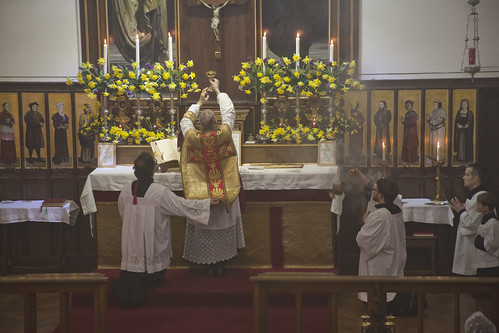 Another photo of Mass for the Feast of St Gregory the Great. The Position Paper on the Prayer for the Jews goes into the question of Medieval anti-Semitism, because of the association between the Traditional Mass and the medieval period. The Middle Ages is when the Traditional Mass assumed its current form in a number of ways. Should we not expect to find in its texts a reflection of Medieval attitudes?
Another photo of Mass for the Feast of St Gregory the Great. The Position Paper on the Prayer for the Jews goes into the question of Medieval anti-Semitism, because of the association between the Traditional Mass and the medieval period. The Middle Ages is when the Traditional Mass assumed its current form in a number of ways. Should we not expect to find in its texts a reflection of Medieval attitudes?
Certainly not in this case, because the Orationes sollemnes, of which the Prayer for the Jews is a part, derive not from the Middle Ages at all, but from Antiquity: probably the 3rd century, with links back to even earlier times. This is the scholarly consensus; the references are in the Position Paper. There is such a thing as Medieval anti-Semitism, and it is a phenomenon which got going in a big way in the 13th century. The Prayer for the Jews of the ancient liturgical tradition was composed a thousand years earlier. That really is rather a long gap.
Relations between Christians and Jews in the Roman Empire were not necessarily very chummy, but when we think of Medieval anti-Semitism there are a number of factors which, obviously, didn't apply in the earlier period. The whole business of European Jews being forced into banking, because there were not allowed to own land, and the subsequent resentment of their usury, for example. The effects of the Crusading movement, which focused attention on 'the infidel' and the betrayal of Christ, which set off anti-Jewish riots. The consequences of the Christian reconquest of Spain, and the problem of integrating large numbers of Muslims and Jews living there into a Christian state. And the theological development which had such bad consequences in the 13th century and later: the Talmud controversy.
Understanding the Talmud controversy gives an important insight into the relationship between the theological milieau of the Prayer for the Jews, and the theological milieu of Medieval anti-Semitism. Up to the time of the controversy there was a theological consensus based on St Paul and on the Fathers, which had three parts. First, the Jewish rejection of Christ was connected with the preaching of the Gospel to the Gentiles; they were destined to accept the Gospel as a corporate body in the last times. This is found in St Paul and numerous Fathers of the Church. Second, in the meantime the Jews gave witness to the truth, by preserving the Old Testament, which confirmed an important part of the Christian revelation. This is the position of St Augustine, and many others. Third, on a practical level they should be allowed to practice their religion in peace. This was the policy of St Gregory the Great, a policy reiterated in the bull of Pope Callixtus III, Sicut Iudeis, in 1120, which was reissued a number of times thereafter. This legislation attests to the difficulties the Jews were experiencing at the hands of Christians, but there was at least an official theological and legislative effort to oppose the persecution of the Jews.
Then the Talmud Controversy came along. This was the claim, made by a convert Jew, Nicholas Donin, that because they accepted the Talmud, Jews could not be considered as giving witness to the truth. This claim struck at the heart of the former consensus. Another claim of this era was that the Jews who sought Jesus' execution knew he was God, and so were guilty of Deicide, and their descendants with them.
I have neither the space nor the expertise to go into all the details of these controversies. It must suffice to say that that both claims were eventually shown - theologically - to be false, but a great deal of Jewish suffering took place in the meantime. It is during the time of the controvery that we find the most disturbing events, not (or not only) for their level of violence, but for the degree of official Church involvement. Anti-Semitic violence, against persons and property, ceased to be limited to the actions of a mindless mob. The great Orders of Friars were involved; so was the Papacy, as well as secular authorities.
The Postion Paper argues that what this dark period of the Church's history shows is not that there is a problem with what St Paul, the Fathers, and the earliest texts of the liturgy, have to say about the Jews, but that things went wrong when those things were rejected. It was the attack on the Patristic view of the Jews which justified the violence of the 13th and 14th centuries. It was the vindication of the Patristic position, by St Thomas Aquinas, by the Council of Trent, and in other ways, that eventually underpinned the re-establishment of a practical policy of toleration.
 There is much which can be said about anti-Semitism in later centuries: about the attitude of Martin Luther, for example; about the conequences of the Enlightenment and the French Revolution; and the rise of nationalism and the Nazis. Catholic involvement in these movements is more complex. But it is obvious, at any rate that the Good Friday Liturgy doesn't reflect the views of, say, the obnoxious anti-Semite Voltaire, or the 'scientific racist' and modernist Renan, let alone the Nazis themselves. Catholics have multiple reasons for rejecting such thinkers, and for their part they are not exactly friendly towards the Church. Catholics did play a part in anti-Semitic movements - a recent article by Francis Philips discusses the role of lapsed Catholics in Hitler's inner circle. But Catholics were also involved prominently in the opposition to them. The 'White Rose' resistance to the Nazis in Munich was formed after Sophie Scholl distributed an anti-Nazi sermon of Cardinal von Galen.
There is much which can be said about anti-Semitism in later centuries: about the attitude of Martin Luther, for example; about the conequences of the Enlightenment and the French Revolution; and the rise of nationalism and the Nazis. Catholic involvement in these movements is more complex. But it is obvious, at any rate that the Good Friday Liturgy doesn't reflect the views of, say, the obnoxious anti-Semite Voltaire, or the 'scientific racist' and modernist Renan, let alone the Nazis themselves. Catholics have multiple reasons for rejecting such thinkers, and for their part they are not exactly friendly towards the Church. Catholics did play a part in anti-Semitic movements - a recent article by Francis Philips discusses the role of lapsed Catholics in Hitler's inner circle. But Catholics were also involved prominently in the opposition to them. The 'White Rose' resistance to the Nazis in Munich was formed after Sophie Scholl distributed an anti-Nazi sermon of Cardinal von Galen.
As for the movement for the traditional Mass, Dietrich von Hildebrand and Eric de Savantham, two of the founding fathers of the lay movement, were prominent anti-Nazis. Hildebrand had to flee Germany, and then Austria, to escape the Nazis; de Savantham defected during the war.
The attempt to associate the Traditional Mass with extremist politics and anti-Semitism, like the attempt to associate it with clerical child-abuse (and here), says a lot about the ancient liturgy's opponents. To reiterate an earlier post in this series, the narrative here is not just about the Traditional Mass, but about the Church's whole past: and that includes the Church's teaching. The Church's teaching on sexuality is the real target; I don't think the liberals would care how we worshipped if there was not this important connection between the prestige of the ancient liturgy with the respect due to the Church's ancient teachings.
You can sign up for the annual symposium of the Roman Forum on Italy's Gardone Riviera here. The Roman Forum was founded by Dietrich von Hildebrand, and two places for students from England and Wales - now filled - are sponsored by the Latin Mass Society.
Support the work of the LMS by becoming an 'Anniversary Supporter'.


